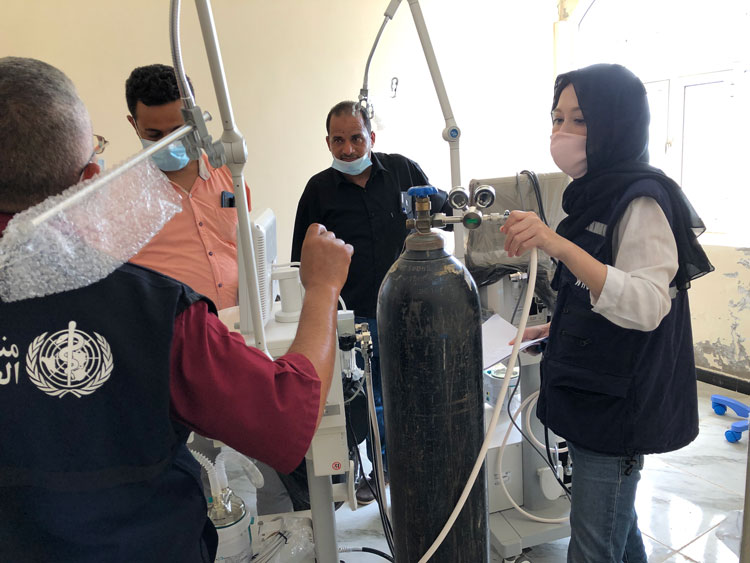 WHO recently organized technical missions to Yemen that aimed to support the country’s response measures to COVID-19 by improving care for critically ill COVID-19 patients and strengthening surveillance and laboratory testing to find new cases.
WHO recently organized technical missions to Yemen that aimed to support the country’s response measures to COVID-19 by improving care for critically ill COVID-19 patients and strengthening surveillance and laboratory testing to find new cases.
The missions, which took place from June to August 2020 in south Yemen, worked with the clinical management taskforce that was launched in late July 2020 after the identification of key senior national consultants. The taskforce worked to discuss, implement, assess, monitor and follow-up on operational plans in clinical management. The missions also reviewed the current surveillance and laboratory practices for COVID-19 implemented by local health authority and partners in south Yemen. Furthermore, mission members actively followed up on the reporting of COVID-19 cases from treatment centres run by partners, and developed protocols for the recording and reporting of suspected, mild and moderate cases that had so far not been reported.
Improving patient care
The first case of COVID-19 in Yemen was declared in Hadramout governorate on 10 April 2020. Soon after, the Ministry of Public Health and Population began active search and contact tracing in all territories. COVID-19 isolation units were established with at least one in each governorate. The number of such units continues to expand as the cases increase. All units have been supported by WHO with COVID-19 essential supplies and equipment such as intensive care unit beds, oxygen, ventilators, personal protective equipment, essential medicines, laboratory supplies and reagents.
Soon after the units were established, on-the-job training was organized for their medical staff across the South and Eastern governorates of Yemen on the clinical management of severe and critically ill patients.
But not all designated isolation units meet functional criteria and they differ in their capacities to serve as COVID-19 intensive care units. The actual proportion of non-functional units is also unknown, signalling an urgent need to reassess the existing units. Additionally, there is an urgent need to implement a standardized protocol for screening, triage and referral of patients with respiratory symptoms at all health facilities.
In response to the above gaps, the Regional Office deployed a technical team to support the local health authority to enhance the clinical management practices in the country. Several training workshops were held for physicians and nurses working in isolation units on care for COVID-19 patients as well as on infection prevention and control measures. The trainees work at different departments, including intensive care units and emergency and internal medicine departments in all designated locations of the southern governorates. A total of 233 physicians and 305 nurses had been trained on patient care by the beginning of July 2020. The training was based on WHO guidance and recommendations, as well as preparing participants with skills on providing optimal care for all patients suffering from several acute respiratory infections.
Building the strategies
Despite all those efforts and achievements made to mitigate the impact of the COVID-19 outbreak, the real spread of the disease in Yemen is yet to be determined. Challenges remain in the areas of surveillance, laboratory testing, reporting, community engagement, and case management, due to a long-standing conflict in the country.
Which is why the missions also focused on establishing long-term strategies, including the national COVID-19 laboratory and testing strategy and workplan to improve laboratory functions and testing protocols for COVID-19. The national COVID-19 surveillance strategy was also developed along with the associated workplan to improve the identification of new cases, testing suspected cases and referring confirmed cases to the treatment facilities.
The missions also facilitated the adaptation and development of the protocol for the COVID-19 sero-prevalence study to be conducted in Aden governorate, which will help identify the percentage of people in this area who had contracted COVID-19 but did not resort to health care facilities for treatment or care.
The national COVID-19 task force endorsed the clinical management protocol and laboratory and testing strategy and these reference documents were disseminated to all health facilities and partners.








